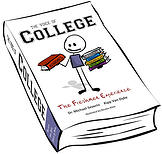As an academic tutor, I have helped countless students make the most of their classes and stay on top of a busy schedule.
After a long break with no coursework, job, academic meetings or extracurricular activities, getting back into school mode can take some time. These 5 tips will improve your study skills and keep you feeling grounded:
1) Thoroughly Review your academic syllabi and make a schedule for your classes EARLY.
If you know where you're headed, you can pre-empt the up and down swings of an academic cycle. Know that you have 3 papers due end of February, maybe you can write one a week early. Want to take a long weekend right before an exam? Plan to study ahead of time and give yourself space to get away. In addition to making your days more pleasant and less stressful, planning ahead will actually enable to you better retain information and ultimately, get more out of our your courses.
2) Balance out the week. Don't cram your classes and activities into one day.
Things get out of hand when you just have too many to-dos. Take a look at the make-up of your week: have you concentrated all your classes on one day? Do you have back to back meetings right after class? Step back for a minute and think about how you can spread your responsibilities over the 7 days of the week. You might find that some breathing room in between classes, work and extracurriculars lets you have more fun and do a better job.
3) Identify free resources on campus: librarians, study groups, teaching assistants.
Many colleges have a ton of resources available to undergrads, but you have to know where to look. For starters, meet your librarians. These individuals are typically experts in a field and a cache of knowledge and information about your next research paper. Also, if you're preparing for an exam, use your Teaching Assistants. These grad students are paid to help you. Use them! Finally, work with your peers to get the most out of your classes. Forming study groups is a great way to check your knowledge and work through challenging concepts.
4) Work hard. Play hard.
You might be surprised hearing this from an academic tutor. The key to a well-balanced education, and more broadly, lifestyle, is equilibrium. Done with your responsibilties for the day. Relax. Make space in your day to enjoy and take care of yourself.
5) Sleep and Eat properly.
This is obvious. If you're underslept and under-nourished, you won't have energy to do any of the above. Don't push off sleep for a late-night party and don't skip a meal for a meeting. Be vigilant about your self-care. This is one of the pitfalls of most college students.
Ok, that's it for today! Good luck!

Comments